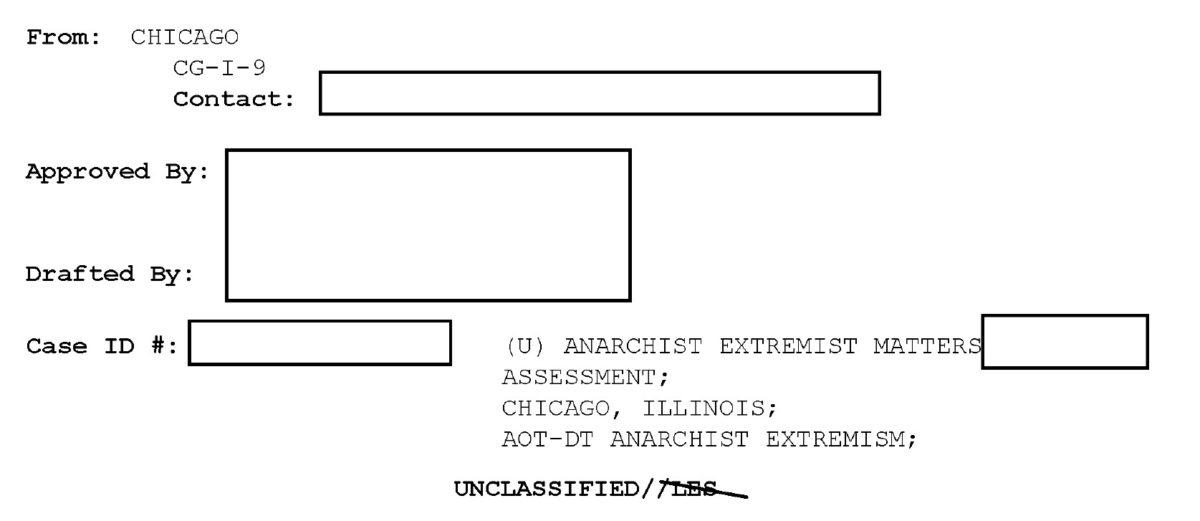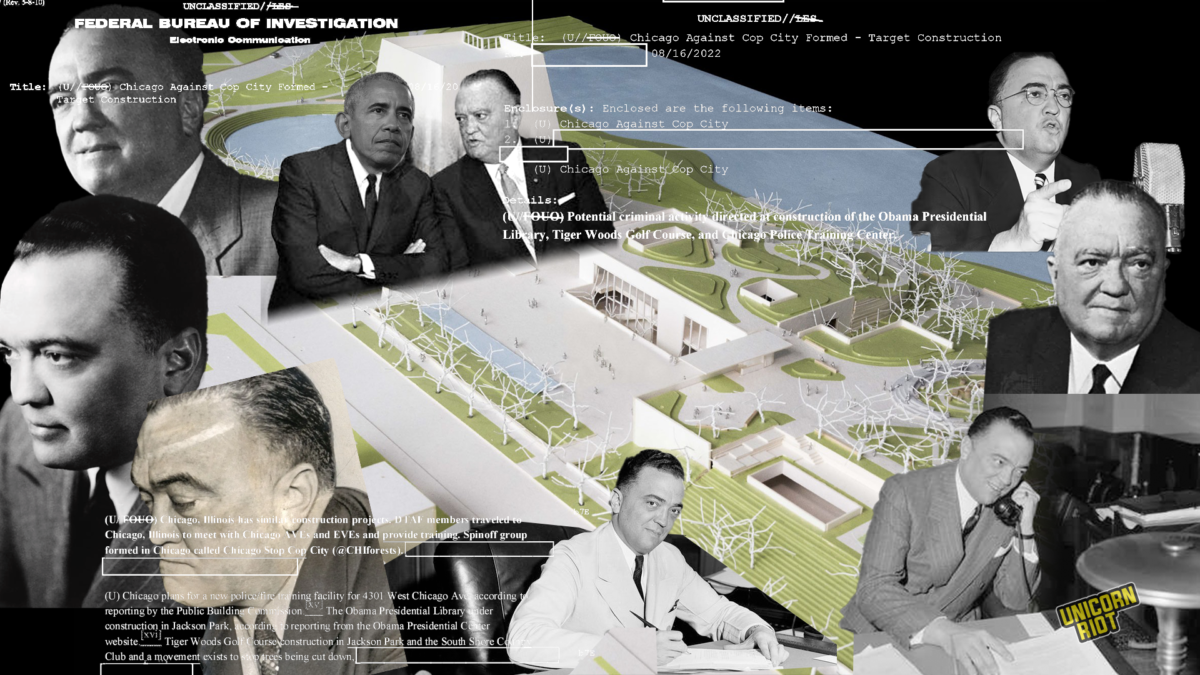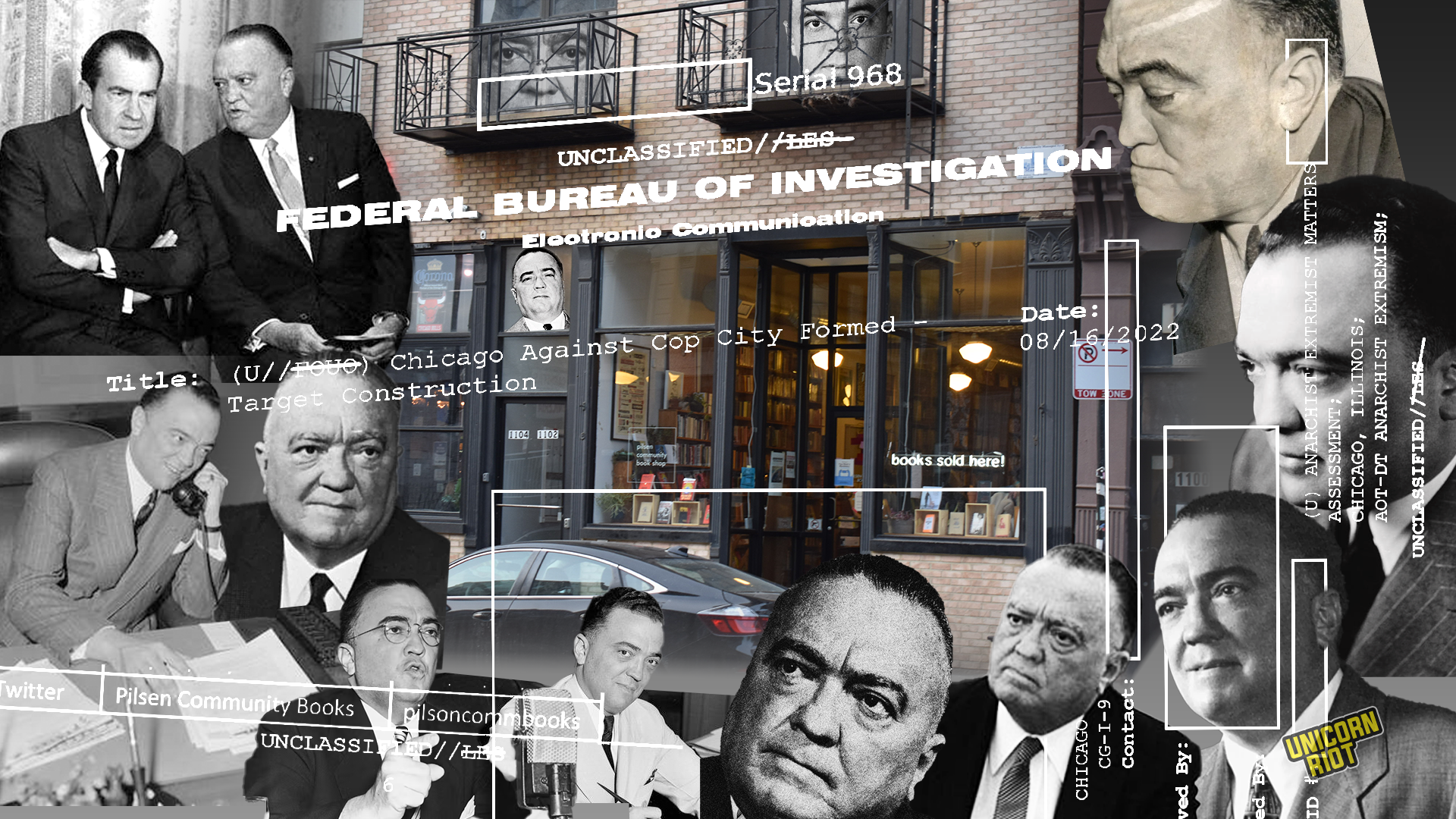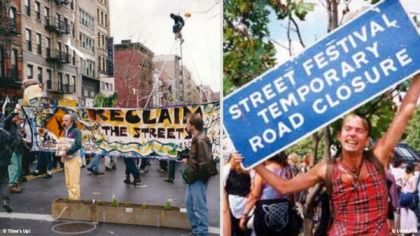FBI Bookstore Spying in Chicago Eyes Abortion Rights, Cop City, Anti-Development Activists
Chicago, IL – The owner-workers of Pilsen Community Books acknowledge that their store is “very cute.” A vintage typewriter holds a signboard featuring a quote that’s both intellectually stimulating and heart-warming. A repurposed mid-century card catalog cabinet holds a collection of vintage mass market paperbacks. Tarot decks with charming wood-cut illustrations and a caterpillar tote bag featuring an anti-police slogan greet the socially conscious shoppers.
But don’t be deceived. At least according to the FBI, there’s more to this bookstore than good vibes and book release events with the latest left-wing author. Beneath the cute exterior, feds insist, a group of “violent extremists” are “planning and networking.”
“That’s news to us!” said Mandy Medley, one of the owner-workers of the store, when told that the FBI believes her store to be a hotbed for terror plots and “pro-abortion extremists.”
Nearly 30 pages of FBI documents obtained by Unicorn Riot reveal a pattern of monitoring of Pilsen Community Books, a worker-owned and collectively managed bookstore in the Pilsen neighborhood of Chicago.
In language reminiscent of the Red Scare, cubicle-lurking FBI intelligence analysts wrote in their reports that the store is used by “anarchist violent extremists,” or “AVEs,” “environmental violent extremists,” or “EVEs” and “pro-abortion extremists.” (While the reports talk about a “source,” importantly, there is no evidence included of physical surveillance.)

Medley and the other worker-owners of the store don’t hide that the space is sometimes used as a gathering point for leftist politics. “We’re open to the public, open to the community,” said Medley. “Everything is very much out there in terms of what we believe and what we do. I was shocked that the FBI would be interested in us this way.”
One thing that appears to have caught the FBI’s attention is what Medley describes as a “sign-painting event” that happened in the store in the lead up to a public demonstration in response to the Supreme Court’s decision in Dobbs.
“Pro-abortion extremists used the PCB to prepare for a pro-abortion direct action, according to the same source,” the document reads, apparently referring to a confidential informant. Although the exact number is unknown, the FBI maintains a roster of at least 15,000 informants, or “confidential human sources” (CHS) in FBI-speak, some of whom are paid as much as $100,000 per case to spy on people.
“It’s really creepy that they call a bunch of socialist feminists who are painting signs and banners for a rally that Pritzker spoke at ‘anti-abortion extremists,’” said Medley, referring to Illinois Governor J.B. Pritzker, who was one of the speakers at the June 24 rally.

“Here’s the thing about PCB—we absolutely do support community organizing (and we are unapologetically leftists),” said Medley, “but community organizing is not illegal, and should not be treated as such.”
The FBI, however, has a long history of investigating community organizing as potentially threatening behavior. Over the course of its more than 100 year history, the FBI has demonstrated a near-obsession with anarchists, leftists, and communists and have aggressively pursued their “enemies” without concern for whether the activities they are investigating are legal or not. (A few other cases of FBI surveillance in Chicago are included below.)
U.S. presidents have ordered the FBI to “persecute pacifists as well as terrorists; they targeted the heroes of the civil rights movement along with the knights of the Ku Klux Klan,” wrote historian Tim Weiner in Enemies, his monumental history of the FBI. At the direction of US Presidents, “the Bureau has violated the freedoms of the Bill of Rights to enforce the president’s powers as commander in chief.”

The documents also revealed the FBI’s concern that activists will target infrastructure projects in Chicago for protest, specifically the Obama Presidential Library, Tiger Woods Golf Course, and the South Shore Country Club. Specifically, they’re concerned that a powerful anti-police protest movement like the one currently underway in Atlanta will spread to Chicago.
The report reads:
“A group in Atlanta, Georgia Defend the Atlanta Forests (DTAF) is a very violent group that used IIDs, IEDs, arson, personal injury devices, and sabotage to construction equipment to stop construction on public park land in Atlanta. Chicago has very similar construction projects and DTAF members came to Chicago to provide training to like-minded individuals. A spinoff group of DTAF was formed in Chicago called Chicago Against Cop City.”
FBI Assessment, “Chicago Against Cop City Social Media Posts,” Serial 974, 8/31/2022

FBI Assessments & ‘Control Files’: A Low Bar to Cover a Wide Scope
Huge portions of the documents released to Unicorn Riot are redacted, so it’s difficult to understand the entire scope of the FBI’s investigation into Chicago activists. But based on the information that is publicly available about how the FBI designates its investigative activities, there are some conclusions that can be drawn.
The documents read “Anarchist Extremist Matters [redacted] Assessment; Chicago, Illinois.” This, as well as the content of the documents themselves, indicate that the documents are the result of what the FBI calls an “assessment.”
Any FBI agent may conduct an assessment on any individual or group, for any reason, at any time–all they need is an “authorized purpose” and a “clearly defined objective.” The agent need not have “probable cause” or even “reasonable suspicion” that a threat exists or any laws have been broken. The agent may conduct an assessment for up to 30 days before requiring permission from a supervisor to continue. There is no time limit for assessments, but they are intended to be “preliminary” and “relatively short.”
During an assessment, the agent may recruit informants to monitor the group or subject, conduct searches on government and commercial databases, physically surveil the individual or, as in this case, deep-scroll through their social media feed (commonly known as ‘creeping’ or ‘lurking’).
In 2008, then-Attorney General Michael Mukasey rewrote the guidelines governing how the FBI conducts investigations. He granted the FBI a long leash for gathering information on individuals and groups for no reason whatsoever by rewriting the language around assessments.
“The FBI must proactively draw on available sources of information to identify terrorist threats and activities,” the Attorney General’s guidelines read. “It cannot be content to wait for leads to come in through the actions of others…”
From 2009 to 2011, the FBI conducted 82,325 assessments, according to FOIA documents obtained by The New York Times. Only a very small percentage of those investigations became full investigations, and even fewer resulted in actual criminal charges.
The case numbers on the documents released to Unicorn Riot have been redacted, making it difficult to understand the full scope of the investigation. FBI case numbers include a number indicating the crime the FBI believes itself to be investigating, which reveals additional information about the investigation. After the case number, FBI documents also contain a “serial” which indicates the number of documents in that case (each ‘document’ in this context may be many pages long).
The documents containing information on the investigation of Pilsen Community Books and “anarchist violent extremists” in Chicago are marked as serials “968” and “974,” indicating that they are part of a larger file containing at least 974 documents. The real number could be much larger.

The May 2021 FBI/Homeland Security report (PDF) “Strategic Intelligence Assessment and Data on Domestic Terrorism” defines “anarchist violent extremism” as encompassing “the potentially unlawful use or threat of force or violence in furtherance of an anti-government or anti-authority violent extremist ideology that considers capitalism and centralized government to be unnecessary and oppressive.”
Former FBI lawyer Coleen Rowley, who reviewed the documents at Unicorn Riot’s request, said her “best guess” was that the serials could be “in a larger control file for ‘assessment’ (not a full investigation which would get its own file) of the Chicago Stop Cop City group,” or in a more ambiguous, broader “‘control file’ relating to various “Anarchist Extremism–Domestic Terrorism.” (Rowley pointed out that frequently the FBI has to be compelled in court to give complete FOIA responses of documents.)
“Control files” are “administrative case files used by the FBI to store information in the [Automated Case Support] system that do not relate to preliminary or full field investigations,” according to a 2008 DOJ Inspector General report (page 39 in PDF).
[In 2002, Rowley blew the whistle about the mishandling of the 9/11 ’20th Hijacker’ Zacharias Moussaoui under then-Director Robert Mueller, leading to a hearing in Congress and an Inspector General report.]
“It’s very easy work to monitor social media and take screen shots, etc to paper up files. Very similar to the spying and massive ‘intelligence’ collecting — mostly guilt by association stuff that filled volumes and volumes, that went on during Joseph McCarthy red scare era morphing into Cointelpro.”
Former FBI attorney & whistleblower Coleen Rowley
Chilling Effects
“It adds a weight,” said MacKenzie Brown, another owner-worker of the bookstore. “As a generally anxious person, it definitely adds a weight to our activism and organizing. It’s not going to deter me, but it adds a little gravity to it.”
That “gravity” Brown refers to is referred to as the “chilling effect” in legal discourse, indicating that certain legal decisions or law enforcement activities can have an undesirable negative impact on the ability of people to engage in legally protected political activities.
Ultimately though, the FBI does not decide to investigate people based on whether their actions are legal or illegal, but based on whether their actions or ideas threaten to radically change the status quo in this country.
“They don’t want us to get together to share experiences, to think and dream of a better world and how to create it,” said Medley. “That’s exactly what the FBI doesn’t want us to do.”
But Brown, Medley and their fellow collective members say they won’t be deterred. “It only strengthens my resolve to continue organizing for a better world,” said Medley. “If this is the way the state is going to behave…this inspires me to keep going with the work.”
Additional Notes on FBI Surveillance Programs in Chicago & Case Files
Assia Boundaoi’s 2018 documentary, “The Feeling of Being Watched,” covers the FBI surveillance campaigns imposed in her Bridgeview community near Chicago. In 2022 an art gallery installation featured thousands of surveillance documents from these FBI operations – Bridgeview is sometimes nicknamed ‘Little Palestine’ for its wealth of Palestinian, Jordanian and Syrian residents.
inviting community to confront thousands of FBI records collected about our Muslim n’hood over a decade of surveillance & then using those records as a canvas to co-create a community archive, has been one of the highlights of my life, closing tomorrow🥹 https://t.co/2KvWfLpkap pic.twitter.com/YbOrAoj6NA
— assia boundaoui (@assuss) July 6, 2022
Chicago’s 2012 NATO summit, a National Special Security Event, attracted powerful protests as well as intense repression from the Chicago Police and FBI. Similar to the new documents, FBI records obtained by Yana Kunichoff via FOIA in 2014 showed keen interest in anarchists. An October 26, 2011 “Situational Information Report” (SIR) called “Anarchists Advocates Adopting the St Paul Principles for Occupy Chicago,” classified “Law Enforcement Sensitive” (LES) was issued as a “Potential Activity Alert.” Tips are requested to the Chicago Field Intelligence Group (FIG). FIGs are, not surprisingly, the FBI’s main intelligence gathering units at the field office level.
Two other reports include “Statistical Accomplishment” namely “Investigative accomplishment” for reports written about people who might attend the NATO summit who attracted their interest. “Statistical accomplishments” are the experience points for advancing FBI careers, which creates an incentive for reporting a completed task of “POSITIVE TERRORISM / LIAISON WITH OTHER AGENCY” on the March 16, 2012 report.
In our ‘Cointelpro Gothic’ report, Unicorn Riot covers how FBI agents generate “statistical accomplishments” through phoning around reports like this to other police agencies. These reports are not based on specific connections to known serious crimes, but in this case got bounced around in jurisdictions like the Southern District of Iowa, managed by then-US Attorney Matt Whitaker, who went on to serve as former president Donald Trump’s acting attorney general.
Another mysterious marking near the title of the new August 31, 2022 document, “Tier 6,” could not be linked to any known FBI system. The FBI has a “Tier 1” and “Tier 2” for classifying sanctioned criminal actions in a highly sensitive realm: “Otherwise Illegal Activities” (OIA), a framework for informants to break the law as needed. OIA is documented further in the Domestic Investigations and Operations Guide (DIOG) which was alleged to have been leaked by former Minneapolis FBI agent Terry J. Albury.
Lastly, a brand new report from the Government Accountability Office analyzed FBI and DHS domestic terrorism programs (96 page PDF). It describes in close detail how Joint Terrorism Task Forces (JTTF), fusion centers, and probes like assessments and investigations are run by the authorities. In 2021, the number of assessments jumped by over 2000, to 5,507. By comparison, the FBI only ran 223 preliminary, 3311 full, and 8 enterprise investigations that year, and claimed 456 “disruptions.” A disruption is purportedly “the interruption or inhibition of a threat actor from engaging in criminal or national security-related activity.”
Documents for Download
- FBI “Chicago Against Cop City Formed – Target Construction” – 8/16/2022 – 14 pages
- FBI “Chicago Against Cop City Social Media Posts” – 8/31/2022 – 15 pages
- FBI/DHS Strategic Intelligence Assessment and Data on Domestic Terrorism – May 2021 – 40 pages
- FBI “Amtrak” file, 3/16/2012 (Yana Kunichoff, In These Times)
- FBI “Hitchhiker” file, 11/8/2011 (Kunichoff)
- FBI SIR, “Anarchist Advocates Adopting St. Paul Principles for Occupy Chicago” 10/26/2011 (Kunichoff)
- “The Federal Bureau of Investigation’s Terrorist Threat and Suspicious Incident Tracking System,” DOJ Inspector General Audit Division, November 2008 – 70 pages (OCR processed)
Photo credits: Pilsen photos by anonymous. J. Edgar Hoover photos via Wikimedia Commons, FBI, NixonTapes.org, by Yoichi R. Okamoto. Excerpt of Barack Obama photo by Ian Forsyth. Illustrations by Dan Feidt.
Follow us on X (aka Twitter), Facebook, YouTube, Vimeo, Instagram, Mastodon, Threads, BlueSky and Patreon.
Please consider a tax-deductible donation to help sustain our horizontally-organized, non-profit media organization:



